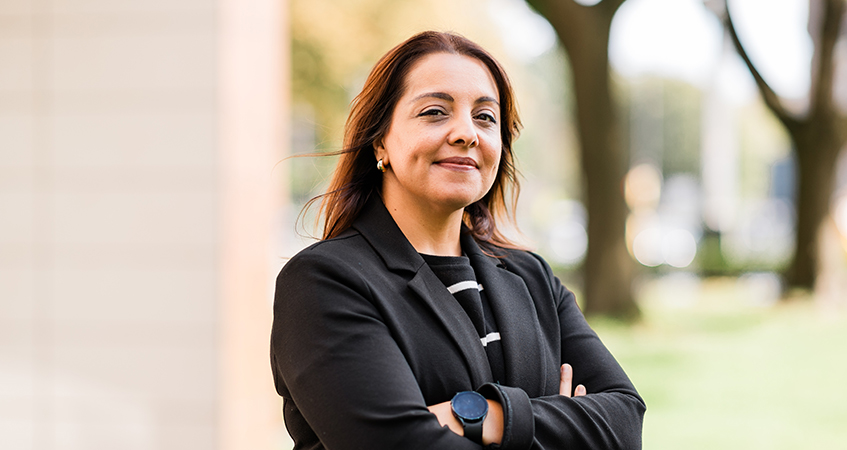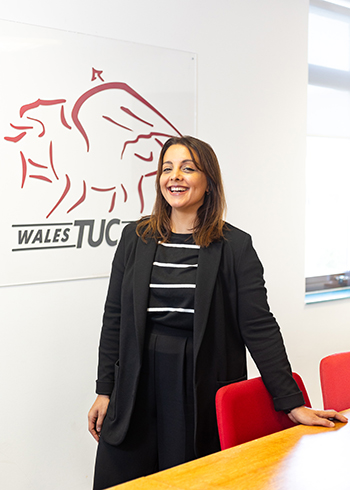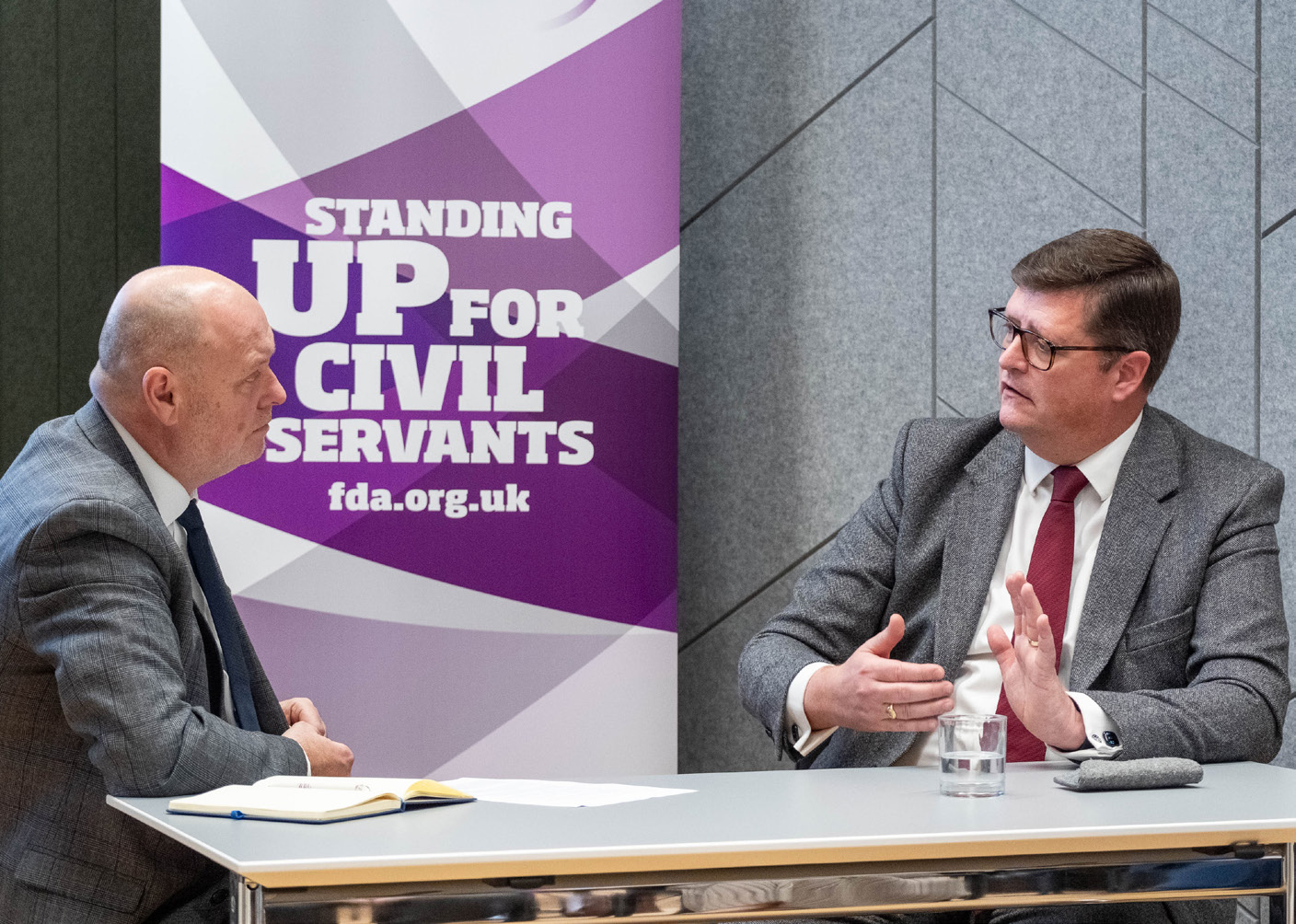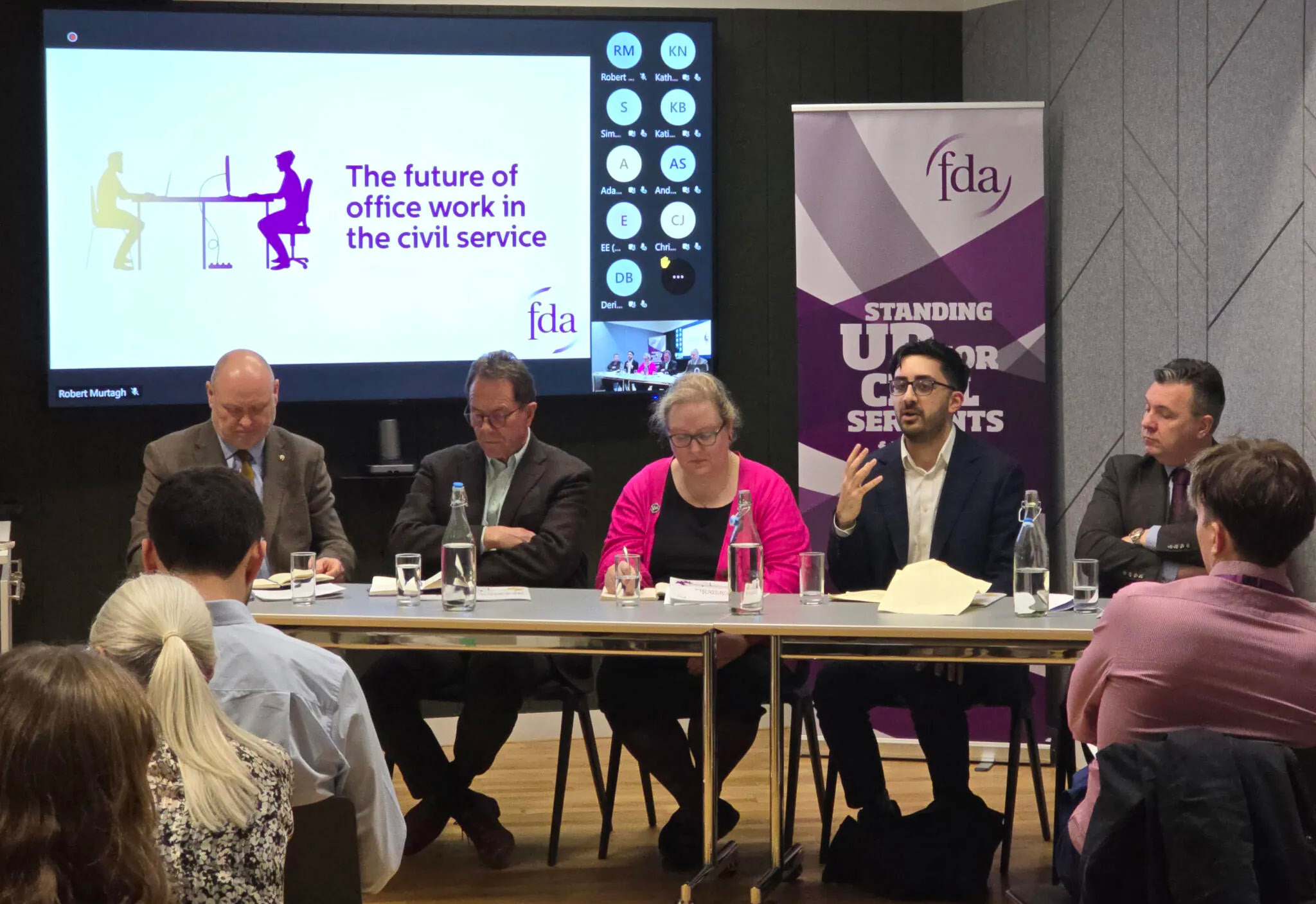Practical Policy: Interview with Shavanah Taj

“The Welsh way of working,” Shavanah Taj explains, is a “tripartite social partnership” where you have the government, employers and trade unions shaping policies and strategic priorities together.
As General Secretary of Wales TUC, the coordinating body for trade unions across Wales, Taj recently welcomed The Social Partnership and Procurement Act that came into effect in Wales. This legislation has put workers’ voices at the heart of the decision-making process – encouraging fair work and codifying the “Welsh way of working” that predates the legislation.
Taj believes this partnership wouldn’t be possible without FDA members: “We wouldn’t have got as far as we have done if it wasn’t for the senior civil servants who are also trade union members… because they’ve genuinely understood what it was we were trying to get out of the legislation… and what the civil servants have been really great at is giving us some insight into what will work and what won’t work.”
“It’s always about practical policy – policy that’s deliverable,” says Taj. “The senior civil servants would always say to us, well, Shavanah, you say you want to get the following things out, this isn’t the place for it… there is another part of government where we’ve already got agreements or a committee structure and that’s where that actually should sit.”
She praised civil servants for not only being very patient and helping set expectation, but also for being “creative about how we get the best agreement possible”.
What opportunities does being a trade union leader in a social partnership bring Taj? “It means that we don’t just get involved in stuff when things go wrong, but we plan ahead as well.” Taj elaborates using the example of the impact of artificial intelligence: “We’vestruck an agreement with the Welsh government about how we can introduce automation, but in a way that is going to benefit workers… Those are the conversations that we’re having now.”
However, when things do go wrong, Wales TUC must be ready to step in. Taj became General Secretary in February 2020, having previously served as President in 2018. Within a month of taking up this role, there was a global pandemic to contend with.
The benefit of being a union leader in a social partnership model is that Taj and the Wales TUC were able to quickly work with the government to solve “practical things that were impacting people who still had to physically go out to work, but also people who were working from home” and identifying key workers – including a number of civil servants. “There’s always been this traditional… strange idea that civil servants are bowler-hatted… all men… extremely well paid, have golden pensions, but it was civil servants administering Universal Credit and rolling out the Furlough Scheme in the most unprecedented circumstances.
“There’s always been this strange idea that civil servants are bowler-hatted men with golden pensions, but it was civil servants administering Universal Credit and rolling out the Furlough Scheme”
“What we did was talk to our government and say, what else can you offer as the Welsh Government?” Taj raised concerns over the nighttime economy being shut down: “What about freelancers?… There’s a number of different people that get impacted. It’s not just businesses, but it’s actually people who are self-employed… So there should be additional financial support for them as well, so we negotiated funding.”
The pandemic also required Wales TUC to extend its reach. A National Health and Safety Forum was created and all affiliates agreed to back a whistleblowing site that allowed anybody, whether a union member or not, to whistle-blow on non-safe practices in their workplace. For Taj, this meant “we had a mechanism in place whereby we could share that information with government in real time and resolve the issue”.
Even when working in a social partnership, with unions and the government around the table as equal partners, challenges and disagreements have been unavoidable. “We currently have at least a £1 billion deficit in our budget for Wales,” explains Taj. “With such a big hole in our funding… we’ve got public sector pay crisis, we’ve had over a decade of underinvestment in public services that’s impacted jobs and pay.” This situation has meant Wales has not been immune from the wave of strikes experienced across the UK in the last 18 months. Taj admits: “It was difficult… However, we still kept talking… There wasn’t a point where we just stopped talking to each other… I always think that based on the evidence, we always tend to find a way forward.”
In her capacity as Wales TUC General Secretary, Taj sits on the Independent Commission on the Constitutional Future of Wales, established by the Welsh Government to consider options for fundamental reform to the UK’s constitutional structures. One of the Commission’s core aims is to consider and develop all progressive options to strengthen Welsh democracy and deliver improvements for the people of Wales. “Civil servants are key to this,” believes Taj, “they will have a massive role to play in terms of policy, in terms of delivery and having the bodies on the ground… you need to have people who have the skillset, the knowledge and experience.”
Taj believes any further devolution will require hiring more civil servants in Wales: “There’s a number of people who lost their jobs in big sites like HMRC, DWP, the courts… and the MoD, really important areas for the civil service… some of those individuals ended up leaving the civil service and have then become consultants.”
To end this cycle, Taj feels “public services need good public servants who are knowledgeable and experienced,” which includes leadership roles. “The civil service needs managing, it needs to be properly looked after and engaged… you need resources to make that happen… you need good managers and they need to be reflective of society.”

Ensuring every workplace is open to all is a vital element of all trade union’s work, and this includes tackling sexual harassment. More than half of women in the UK have experienced sexual harassment in workplaces, and this rises to nearly two-thirds of women aged 18 to 24. To help tackle this, Wales TUC, alongside Welsh Women’s Aid, has created a Sexual Harassment Toolkit. This practical guide helps to identify sexual harassment in the workplace, gives advice on holding employersto account and provides support to workers.
Taj described the toolkit as “very practical… there are parts of it for reps, but also things that employers can do”. She encouraged employers and HR departments to “literally cut and paste, [then] make some adjustments” to create their own sexual harassment policies.
Taj was proud to say that the toolkit has now been endorsed by all blue light services in Wales and that local authorities in Wales are being trained on the contents.
Having a zero-tolerance position on sexual harassment is not only “about offering protections to people, having practical policies in place, but making sure that people have confidence in the system”.
Tackling sexual misconduct in workplaces across Wales doesn’t mean avoiding self-reflection. “We can’t make out like there’s not a problem in our movement, because it’s a problem insociety,” argued Taj. If members are relying on their union to help fight sexual harassment, those unions must be able to demonstrate that their own house is in order. For Taj, “it’s about offering protections to people, having practical policies in place… making sure that people have confidence in the system”.
It has also meant demonstrating best practice and assessing how your organisation operates on a day-to-day basis. “How can we, as an employer, support our staff… but also for participants?,” posed Taj. “When we organise events, what checks and balances do we have in place… what are our risk assessments for participants or for staff? Making sure you have answers to these questions are vital for ensuring members can reply on you.”
In the UK Parliament, the FDA played a crucial role in the introduction of an independent complaints system for bullying and harassment. FDA Cymru|Wales has been campaigning for a similar system to deal with complaints against members of the Senedd. FDA National Officer for Wales Gareth Hills has criticised the current system, as it falls behind the standard set in Westminster and relies on MSs “marking their own homework”.
“People don’t have confidence in the system. There has to be an independent way of monitoring and evaluating MSs’ behaviour”
Taj, who in her previous role as a PCS trade union official represented people working in the Senedd, agrees with Hills. “There is a big issue with sexual harassment and bullying… people don’t have confidence in the system… I’ve seen so many situations where people have ended up just resigning because they just can’t cope anymore.” She continued that “there has to be an independent way of monitoring and evaluating” MSs’ behaviour. “I just can’t see how it’s even possible to tell anyone that it’s a fair system if you’re marking your own homework.”
Can Taj see the system changing anytime soon? “I want it to change and I will continue to campaign hard and support the FDA in taking that forward.”
“We are open”: increasing diversity and representation within unions
Opening up trade unionism to a more diverse group – especially from ethnic minority backgrounds – has been a life’s work for Taj, who was herself the first person of colour to become Wales TUC General Secretary. Taking up this role, at such a crucial moment, has helped to attract a greater diversity of union members.
During the early stages of the pandemic, a helpline was established to help people from ethnic minorities in Wales, and Wales TUC and affiliates agreed to pick up any employment-related queries that were coming through – even if the person wasn’t a member of the union. Taj believed this would create opportunities and encouragement for them to join a union in the future. “Normally unions have the traditional model. You have to be a member for so long before you can get advice and support. By removing some of those structural barriers… we’ve demonstrated that we do work together, we are open.”
Taj is also clear that the push for diversity cannot end in membership; it must extend to activists. While she admits “the trade union movement traditionally has always predominantly been men”, she adds that in the past few years “we’ve seen more diversity in our rep structures” in terms of background, age and ethnicity as well as gender.
Being able to speak to workers from underrepresented groups was vital for Taj during the pandemic, using her platform to discuss injustice and linking it back through how institutional discrimination impacts people’s daily lives. “I was able to provide a real insight and back that up with evidence… I think that people often talk about lived experience and it’s one of those things that just gets banded around… but genuinely having workers represented in a variety of different groups that we were engaging with, and having ministers there engage, made a massive and real difference.”
Related News
-

Under significant pressure: Interview with Director of Public Prosecutions
Tom Nathan speaks to Crown Prosecution Service Director of Public Prosecutions Stephen Parkinson about CPS’s handling of riots, the importance of impartiality and his plan to help reduce unmanageable prosecutor caseloads.
-

Changing the culture
HM Chief Inspector Sir Martyn Oliver sat down for an ‘in conversation’ event with FDA General Secretary Dave Penman, discussing the pace of change in Ofsted, challenging perceptions and tackling the long hours culture in Education.
-

Hybrid working: Led by evidence, not headlines
Tom Nathan shares the findings and recommendations of the FDA’s recent report on ‘The future of office working in the civil service’.